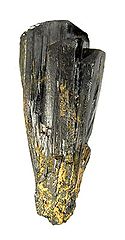Coltan mining and ethics
In the early 21st century coltan mining is associated with human rights violations such as child labour, systematic exploitation of the population by governments or militant groups, exposure to toxic chemicals and other hazards as a result of lax environmental protection, and general safety laws and regulations.
Issues like forced labor, Indigenous displacement, and corruption highlight broader challenges of neoextractivism and conflict mineral regulation.
"[13] A report by the Commission of the European Union in 2011 raised issues of child labour in coltan mining in DRC, and in the recycling industry in Ghana and China.
Many of the burgeoning coltan producers are resource-rich developing countries with economies that are currently largely dependent on mining non-renewable resources.
[18] This land tension typically leads to poor economic performance and political instability, which in turn creates the conflicts that make coltan an ethically charged commodity.
[22] Preliminary results of an ongoing study also hint that babies born to miners suffer "an increased risk of birth defects.
[citation needed] Coltan mines operate under boom-bust economics and not only strip the mineral from the land, but also cause environmental degradation.
[28] The World Wide Fund for Nature (WWF) and the UN advocate for extractive activity to stop in UNESCO World Heritage sites and in proposed protected areas within conservation sites, in areas with last remaining examples of unique ecosystems, and in places where mining threatens the well-being of local communities and indigenous peoples.
[3] Most of the coltan activity takes place in the deep jungle areas along the Southeastern borders of Venezuela or Brazil, causing severe environmental repercussions.
[34] In Venezuela, the government has sent military patrols into the jungle to root out illegal mining activities and the Colombian cartel leaders who fund these operations.
[2][35] The Venezuelan government promotes the Arc as a solution to economic woes, emphasizing the potential for mineral exports to boost revenues.
Mining operations have resulted in deforestation, loss of biodiversity, and widespread contamination of water sources, including the Orinoco and Caroní rivers, through mercury and other pollutants.
[37] These impacts align with broader concerns about the environmental toll of resource extraction, as discussed in global studies of coltan mining.
Armed groups and criminal organizations control significant portions of mining operations, often with the complicity of government and military officials.
Coltan, a key component in electronic devices, is in high demand globally, leading to exploitative mining practices in regions like Venezuela and the Democratic Republic of the Congo.
[43][35] The Orinoco Mining Arc represents a central pillar of Venezuela’s neo extractivism strategy, emphasizing resource extraction to address economic crises.
While mining revenues provide short-term financial relief, critics argue that this approach entrenches economic dependency and social inequality.
Efforts to regulate mining within the Arc have been criticized as inadequate, allowing illegal operations to persist and contributing to environmental degradation and social harm.
[31] However, the process is expensive and lengthy and while it has worked in Rwanda, adapting these fingerprinting techniques to the DRC mining industry and convincing countries such as China to adopt these methods has been difficult.
[citation needed] Roughly 60% of the coltan mines in Africa, including in the DRC, have some percentage of Canadian backing but are not subject to Canada's laws about environmental hazards and human rights violations.
Back in 2004, the TIC (Tantalum-Niobium International Study Center) had little interest in regulating conflict materials, but since then has become one of the leading voices promoting conflict-free minerals.
Awareness campaigns in Western countries have pushed manufacturers such as Apple and Intel to rely on more than just the word of their suppliers that the coltan used in their products is conflict-free.

